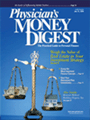Publication
Article
Physician's Money Digest
PRN: Considering Your Retirement
Author(s):
Our surveys consistently show thatretirement planning and executionis the number-one topic of interestfor our readers. What makes this allso interesting is that we know we livefinite lives, which can help planning,but the details are unknown, which isbad for planning. Humanity plans andGod laughs.
Make no mistake; this is an importantconcern, made more so by the statisticallengthening of the averageAmerican life as we enter the 21st century.When you think about it, everyone'snightmare retirement scenario isoutliving their money.
What Do We Know?
We know saving in a tax-free vehiclelike a 401(k) or IRA plan is very helpfulto the program. And we also know thatit is vital to start early, even if theamount saved per time period is small.That's the miracle of compound interest.
We also know that we need to diversifyover a couple of different investmentareas like big, small, and foreignstocks; bonds; and real estate becauseno one has yet been able to consistentlypredict when or where or by howmuch the valuations will change. Weonly know that that they will changeand often not in sync with each other.Ergo, diversification and its attendantannual rebalancing is our protection.
We know that financial informationis complicated, confusing, and alwayschanging. So we are compelled to keeplearning, just as we do in our professions,to stay abreast of developmentsas best as we can.
The human brain has evolved tolearn certain things only when it isready—when it has acquired a baseupon which to build to a higher level ofsophistication. Just try explaining sex toa 4-year-old to see what I mean. Later,sometimes surprisingly not very later,kids are ready to hear all about it. Thisis called layered knowledge. It requiresthat we keep going, whether in sex orin money, to get it when we're ready.
What Should We Do?
While we're planning for a safe andsane retirement, don't make the oft-repeatedassumption that you'll onlyneed 70% or 80% of preretirementincome afterward. Plan on 100%, ifpossible. You are accustomed to livingat a certain level and in the early partof this period, travel and other long-delayedinterests present a surprisinglybig drain. As we age and activitieswith their attendant expenses decline,health care costs rise, often alarmingly.One survey showed that for someretirees, health care costs have increasedto 500% of their budget,Medicare notwithstanding.
Another organic part of our retirementplanning is estate planning. Infact, you can't do one without theother. We are all too aware thattomorrow is promised to no one andthat all of life is in fact a contingency,so it behooves us to be organizedabout the unpleasant as well as thepleasant possibilities. If you have acogent estate plan, review it. If youdon't have one, just do it. Hire anexpert planner, sometimes travelingunder the guise of an insurance agent,and a lawyer who specializes in suchthings. This means a will, durablepower of attorney, advanced healthdirective, and letter of instructionabout where everything is and what todo if worst comes to worst. Your lovedones will love you more if they alsodon't have to face the double grief ofa disordered legacy.
Finally, keep in mind that retirementis usually not some idealized line overwhich you cross to Eden. It's an integralpart of our lives. As with every otherpart of life, we have to start with,"What do I want and need and howcan I arrange that?"
Jeff Brown, MD, CPE, a partneron the Stanford UniversityGraduate School of BusinessAlumni Consulting Team, is apracticing primary care physician.He welcomes questions andcomments at jeffebrownmd@aol.com.
